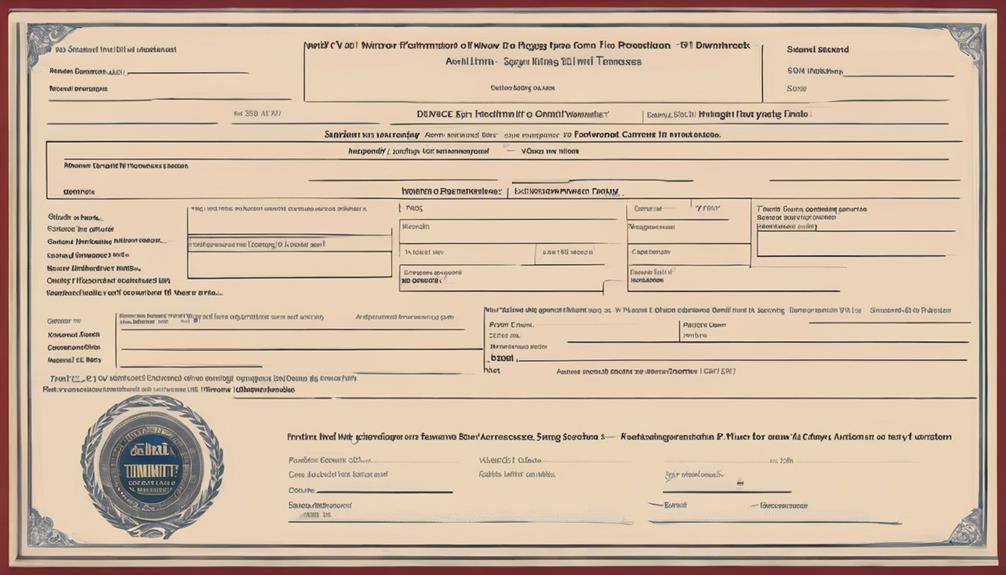When starting the divorce process in South Carolina without following the usual one-year waiting period, we enter into a complex journey that demands careful attention and adherence to specific procedures. These procedures serve as guiding lights, leading us through the intricate terrain of legal requirements and emotional challenges that come with this process.
By understanding the intricacies of each stage, we pave the way for a smoother transition toward the dissolution of a marriage. The initial steps are crucial, setting the tone for what lies ahead and ultimately leading to a resolution that can bring closure and the promise of a fresh start.
Key Takeaways
- Understanding fault-based grounds is crucial for expedited divorce.
- Filing a detailed initial petition sets the tone for a quicker process.
- Properly serving divorce papers initiates timely legal proceedings.
- Promptly addressing spouse's response aids in efficient negotiations.
Understanding SC Divorce Requirements
To navigate the divorce process in South Carolina efficiently, it's crucial to grasp the specific legal requirements for different grounds of divorce.
In South Carolina, fault-based grounds such as adultery, physical cruelty, habitual drunkenness, and desertion offer avenues to expedite a divorce without waiting a year. Proving these fault-based grounds necessitates providing evidence to support the claims made.
Adultery, physical cruelty, habitual drunkenness, and desertion are recognized as valid reasons for expediting the divorce process in South Carolina. Once the fault-based ground is substantiated, a final hearing can take place as soon as 90 days after filing, offering a swifter resolution.
Understanding the nuances of the legal requirements and the evidence needed for fault-based grounds is imperative for successfully obtaining a divorce without the one-year separation mandate in South Carolina. By being aware of these specifics and gathering the necessary evidence, individuals can navigate the divorce process more effectively and efficiently in the state.
Filing Initial Divorce Petition

Filing the initial divorce petition in South Carolina marks the official commencement of the legal divorce process, detailing essential information about the marriage and setting the groundwork for resolving key issues. When filing for divorce, it's crucial to ensure the accuracy and completeness of the petition to avoid delays or complications down the road.
- Grounds for Divorce: Clearly stating the grounds for divorce in the initial petition is vital as it lays the foundation for the legal dissolution of the marriage. Whether it's based on fault or no-fault grounds, accuracy in this section is paramount.
- Child Custody and Support: Providing detailed information regarding child custody and support arrangements is essential for the well-being of the children involved. The initial petition sets the tone for these crucial decisions.
- Property Division: Clearly outlining the assets and debts to be divided between spouses is necessary for a fair distribution. Accuracy in property division details can help streamline this aspect of the divorce process.
Serving Divorce Papers to Spouse
After filing the initial divorce petition in South Carolina, the next crucial step in the process is serving divorce papers to your spouse, ensuring they are properly notified of the legal proceedings. Proper service of divorce papers is essential to inform your spouse about the divorce proceedings. This step involves delivering legal documents, including the summons and complaint, to your spouse. Failure to serve these papers correctly can lead to delays and legal issues. Typically, divorce papers are served through personal service by a sheriff, process server, or certified mail. Below is a table summarizing key points regarding serving divorce papers to your spouse:
| Key Points | Details |
|---|---|
| What to Serve | Summons and complaint |
| Methods of Service | Personal service by sheriff, process server, or certified mail |
| Importance | Ensures spouse is informed of legal action being taken |
| Risks | Improper service can lead to delays and legal complications |
| Legal Requirement | Must serve legal documents to initiate the divorce process |
Responding to Spouse's Answer

When your spouse responds to the divorce petition, it's essential to address any counterclaims or defenses they raise promptly.
Negotiating settlement terms can help resolve disagreements and potentially streamline the process towards an uncontested divorce.
Seeking legal guidance can assist in navigating this stage effectively and safeguarding your rights during the divorce proceedings.
Spouse's Counterclaims and Defenses
Navigating a spouse's counterclaims and defenses in response to divorce papers can significantly impact the trajectory of the divorce proceedings. When faced with a spouse's answer, emotions may run high as the legal process unfolds. Here are three key points to consider:
- Counterclaims can introduce new grounds for divorce, adding complexity to the case.
- Defenses may challenge the validity of the claims laid out in the initial divorce papers, leading to potential conflicts.
- Timely filing of counterclaims and defenses is critical to ensure all arguments are considered and addressed promptly.
Understanding the implications of these responses is crucial in shaping the direction of negotiations or court hearings that may follow.
Negotiating Settlement Terms
In light of your spouse's response in the divorce proceedings, addressing the settlement terms is a pivotal step towards reaching a mutually agreeable resolution. When negotiating settlement terms post your spouse's answer, it's essential to communicate effectively and document all agreements or disagreements. Seeking legal advice can provide clarity on responding to the spouse's answer, ensuring that your rights are protected. Understanding your spouse's concerns and perspectives can facilitate smoother negotiations, potentially expediting the divorce proceedings. Here is a table to help you navigate this phase effectively:
| Key Steps | Tips |
|---|---|
| Communication | Clearly express your thoughts and listen actively to your spouse's input. |
| Documentation | Record all agreements and disagreements in writing for future reference. |
| Legal Advice | Consult with a family law attorney to understand your legal options. |
| Understanding Concerns | Show empathy towards your spouse's concerns to foster cooperation. |
Negotiating Settlement Agreement

When negotiating a settlement agreement, we need to focus on terms related to asset division, custody arrangements, and other crucial aspects of the divorce.
It's essential for both parties to be open to compromise and effective communication to reach a fair agreement.
Seeking legal advice can also ensure that the terms of the settlement agreement are favorable and just.
Terms of Agreement
Wondering how to tailor your settlement agreement to address crucial divorce matters in South Carolina? When negotiating the terms of your agreement, it's vital to consider the following:
- Child Custody and Visitation: Ensuring a fair and workable arrangement that prioritizes the well-being of your children.
- Child Support: Determining financial support to meet the needs of your children post-divorce.
- Property Division and Alimony: Allocating assets and debts equitably, and deciding on potential spousal support.
Asset Division
As we navigate the process of negotiating a settlement agreement, one crucial aspect to address is the division of assets, including real estate, vehicles, savings, investments, and personal belongings. When dividing marital property, it's essential to consider each party's contributions during the marriage and their individual financial needs. The negotiation process aims to reach a fair and equitable settlement agreement without the necessity of a trial. Seeking legal guidance can be beneficial in navigating complex asset division issues and ensuring a favorable outcome.
| Marital Property | Asset Division | Settlement Agreement |
|---|---|---|
| Real Estate | Vehicles | Savings |
| Investments | Personal Belongings |
Custody Arrangements
Let's craft a well-drafted custody agreement by addressing physical and legal custody details to ensure a smooth post-divorce transition for all involved. When negotiating custody arrangements, it's essential to consider the children's best interests and parental responsibilities.
Here are three crucial elements to focus on during custody negotiations:
- Visitation Schedules: Creating a clear and consistent visitation schedule can provide stability for the children and help both parents stay involved in their lives.
- Decision-Making Authority: Clearly defining decision-making authority regarding important aspects of the children's lives can prevent future conflicts and ensure effective co-parenting.
- Collaborative Law: Consider utilizing mediation or collaborative law techniques to facilitate constructive discussions and reach a mutually beneficial settlement agreement amicably.
Attending Mediation (If Required)

If your divorce in South Carolina is contested, attending mediation is a crucial step that aims to help both parties reach agreements on various issues such as child custody, support, and property division. In South Carolina, mediation is often required in contested divorces to resolve disputes before proceeding to court hearings.
During mediation sessions, spouses work with a neutral third-party mediator to facilitate communication and negotiation. The goal is to find mutually acceptable solutions that address concerns regarding child custody arrangements, financial support, and the division of assets and debts.
Successfully reaching agreements through mediation can streamline the divorce process and avoid the need for lengthy court battles. However, failure to come to agreements in mediation may result in court hearings where a judge will make decisions on these matters.
Therefore, approaching mediation with an open mind and a willingness to cooperate can lead to a more efficient and amicable resolution of the divorce proceedings.
Finalizing Divorce Decree

After successfully navigating the mediation process to address key issues in a contested divorce, the next crucial step is finalizing the divorce decree, where the court approves the terms of the settlement. This stage is pivotal as it cements the agreements regarding property division, child custody, visitation, and support into a legally binding document that outlines the rights and responsibilities of each party post-divorce.
Here are three key emotional points to consider during the finalization of the divorce decree:
- Closure: The completion of the divorce decree signifies the conclusion of the divorce process, offering closure to both parties and allowing them to move forward with their lives.
- Clarity: By having the terms of the settlement officially approved by the court, there's a sense of clarity regarding what's expected from each party moving forward.
- Relief: Knowing that the divorce decree is in place can bring a sense of relief, as it provides a structured framework for the future and resolves uncertainties that may have lingered during the divorce proceedings.
Court Approval of Settlement

Upon reaching a mutual agreement on all issues, court approval of the settlement in a divorce case without waiting a year is essential. The settlement agreement should cover crucial aspects such as property division, child custody, visitation rights, and financial support. Once the settlement is finalized between the parties, it is then submitted to the court for review and approval to expedite the divorce process. This court approval signifies that the terms agreed upon are fair, just, and in compliance with South Carolina divorce laws, allowing the parties to avoid the typical one-year waiting period for divorce based on continuous separation.
| Key Aspects | Description |
|---|---|
| Property Division | Equitable distribution of assets and debts between the parties. |
| Child Custody | Determination of the best interests of the child and custody arrangements. |
| Visitation Rights | Establishing schedules for non-custodial parent visitation. |
| Financial Support | Setting up child support and alimony arrangements. |
Dividing Assets and Debts

When dividing assets and debts in a divorce in South Carolina, it's crucial to understand the state's equitable distribution laws that govern this process. Here are some key points to consider:
- Equitable Distribution: South Carolina follows equitable distribution laws, meaning that marital assets and debts are divided fairly, not necessarily equally. This process aims to achieve a just outcome based on various factors.
- Financial Considerations: The court takes into account each party's financial situation, contributions to the debt, and any prenuptial agreements in the division of property and debts. This ensures that the division reflects the specific circumstances of the marriage.
- Seeking Legal Guidance: Given the complexity of the process and the importance of a fair outcome, seeking legal advice is highly recommended. A family law attorney can provide valuable assistance in navigating the division of assets and debts to achieve a satisfactory resolution for both parties.
Obtaining Final Divorce Decree

To expedite the divorce process in South Carolina, specific grounds such as adultery, physical cruelty, habitual drunkenness, or desertion can lead to obtaining a final divorce decree without waiting the typical one-year period. Adultery, in particular, is a fault ground that can accelerate the process, allowing for a quicker resolution. Providing proof of fault-based grounds like adultery can result in a final divorce decree within 90 days of filing, bypassing the standard waiting period in South Carolina. This expedited method under fault grounds offers a more efficient way to reach a final resolution and move forward with your life. Below is a table illustrating the effectiveness of fault grounds in obtaining a final divorce decree promptly.
| Specific Grounds | Expedited Process |
|---|---|
| Adultery | Quicker Resolution |
| Physical Cruelty | Faster Hearing |
| Desertion | Efficient Outcome |
Frequently Asked Questions
Can You Get a Divorce in SC Without Waiting a Year?
Yes, in South Carolina, you can get a divorce without waiting a year if there are grounds like adultery, physical cruelty, or habitual drunkenness. Understanding these grounds can help expedite the process and avoid the one-year separation requirement.
Can You File for Divorce Before 1 Year in Sc?
Yes, in South Carolina, we can file for divorce before one year under fault-based grounds like adultery, cruelty, drunkenness, or desertion. Proving these may allow for a quicker divorce process. Consulting with a family law attorney is crucial.
How Fast Can You Get Divorced in Sc?
Getting divorced in SC can vary in speed based on factors like mutual agreement and fault grounds. Expedited proceedings are possible with cooperation and specific grounds. Efficiency matters, but court schedules impact timelines.
What Is the First Step to Divorce in South Carolina?
The first step to divorce in South Carolina involves establishing fault grounds like adultery or physical cruelty for a quicker process. Providing evidence for these grounds is essential. Consulting a family law attorney can help navigate this path efficiently.
Conclusion
As we navigate the complexities of divorce in South Carolina, let's remember that we've the power to make the process smoother and faster by working together towards a mutual agreement.
By following these 10 steps and seeking legal guidance, we can achieve a peaceful resolution and move forward with our lives.
Remember, you have the ability to control your own destiny and create a better future for yourself. Keep pushing forward, you've got this!










